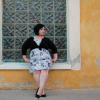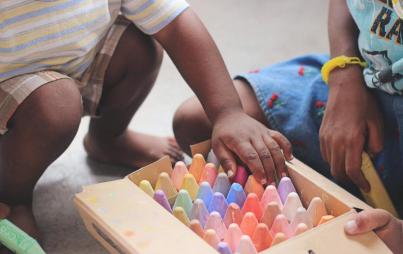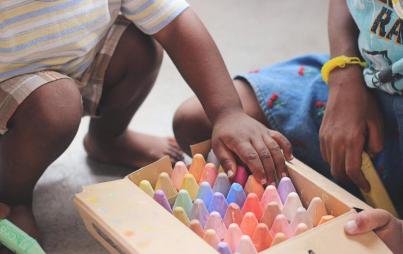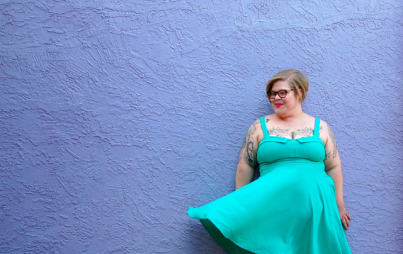
"I still have so much to learn."
I was totally a homeschool kid.
Some (OK, most) like to tease us for our decidedly “uncool” education (and bizarrely large collection of wall maps), but I’ll tell you what: I loved it and it had a significant impact on the me I know today. And I like the me I know today.
NOTE: Homeschooling as a practice can be done a million and one ways. Curricula and their origin vary, amount of time spent in the home can vary, socialization approaches vary, family investment may vary . . . I share this so you know that I’m only speaking from my experience — the limited experience of one of three schooled-at-home kids with dedicated curriculum and strong ties to a large homeschooling community. Read: my mom kept us home, made us do a lot of homework, we were unappreciative, and we had a lot of picnics with other kids at parks.
Aside from acquiring the skills needed to curl my bangs upwards and abuse my Aquanet privileges (which I blame on the '90s and not my mom) there were a lot of valuable things that I learned during my young educational experience, three of which continue to help me today:
1. Life doesn’t need to be looked at from the outside. You can go INSIDE.
I don’t know a kid who doesn’t like field trips, but I was especially obsessed. Obsessed as in I would lose sleep from sheer excitement the night before a trip and wanted to be Mr. McFeely’s best friend so I could live inside his Speedy Delivery video tapes. THAT’S HOW MUCH I LOVED FIELD TRIPS.
For your enjoyment:
If you don't like McFeely, come on. Who doesn't like McFeely?
Aside from being way more fun than a math book, going on a million educational adventures became something else for me: it became a breaker of barriers between me and the inner workings of the world. I was able to see exactly how newspapers were printed. How they made that magical green screen into a weather report. How they packaged grocery store cakes and how especially awesome sports journalists think they are.
This gave me permission to connect with the inside of our society. It allowed me to step behind the scenes. It made me aware as a child that inside every business, product, performance, and government system there were a million pieces at work. Field trips gave me permission to ask a lot of annoying questions and search for all the answers.
Still do that. Sorrynotsorry.
2. You can do things. Just try it.
Having the ability to homeschool your children is a gift wrapped in a ribbon of privilege with a bow of opportunity on top. There is no need to pretend like this isn’t the case, and while we sometimes struggled to make ends meet, my mom was still able to stay home and educate us. This meant that we were born knowing we had some ability to be “whatever we wanted to be when we grew up,” and I recognize this for the extreme privilege it is.
Aside from that, we were also taught a more subtle version of “you can do anything,” and it manifested in ways that I still use in my daily life. It’s perhaps best explained through an experience as a young‘un in my first writing class at Pima Community College.
I was writing what I thought to be a groundbreaking paper on why we’re so addicted to violence and tragedy in our news. (Props to Jack Johnson’s song “News” for the angsty inspiration). While researching, I remember thinking: “Who is an expert on news that I can talk to?” I answered myself with, “Why, a reporter for the New York Times of course!” Without an ounce of (probably needed) self-doubt, I searched for a few numbers and names and gave them a call.
And the world totally enabled me. I got an interview, scribbled down the quotes (this was long before smartphone recorders and Skype) and turned in that goddamn community college Writing 101 masterpiece like it was the answer to world peace. Which at the time, I probably thought it was.
I, thanks to what I learned from field trips and pep talks from from my mom, believed that nothing and no one was out of reach. I didn’t see people or things as untouchable. I didn’t see myself as insignificant and I didn’t doubt my ability to reach out. The naivete is now gone and I now doubt myself regularly as an adult, but when faced with a giant leap I try to remember that invincible feeling as a teen and go for it anyways.
Case in point; I’m about to email Gabourey Sidibe right after I finish this article. Wish me luck.
3. There is a different solution for everyone and they’re all good.
There is something to be said for feeling comfortable when you choose what works for you. Homeschooling taught me that this is OK simply by existing. And guess what? It applies to everyone. If it works for you, it’s good!
If homeschooling works, good! If public schooling works, good! If “natural learning” or unschooling works, good! If GATE works, good! If focused learning groups work, good! If specialized education works, good! If a combination of all of them work, GOOD!
What worked for me doesn’t work for everyone else, and I’d love to have a conversation sometime soon about how opportunity isn’t equal, how learning styles are as diverse as you can imagine, and how we can make sure that every child gets the best type of education for them as possible.
For now I have only my wide-eyed childhood personal experiences to share, and they are as limited as can be. I would love to hear yours if you feel so inspired . . . what did you learn as a result of your childhood education? I still have so much to learn.








